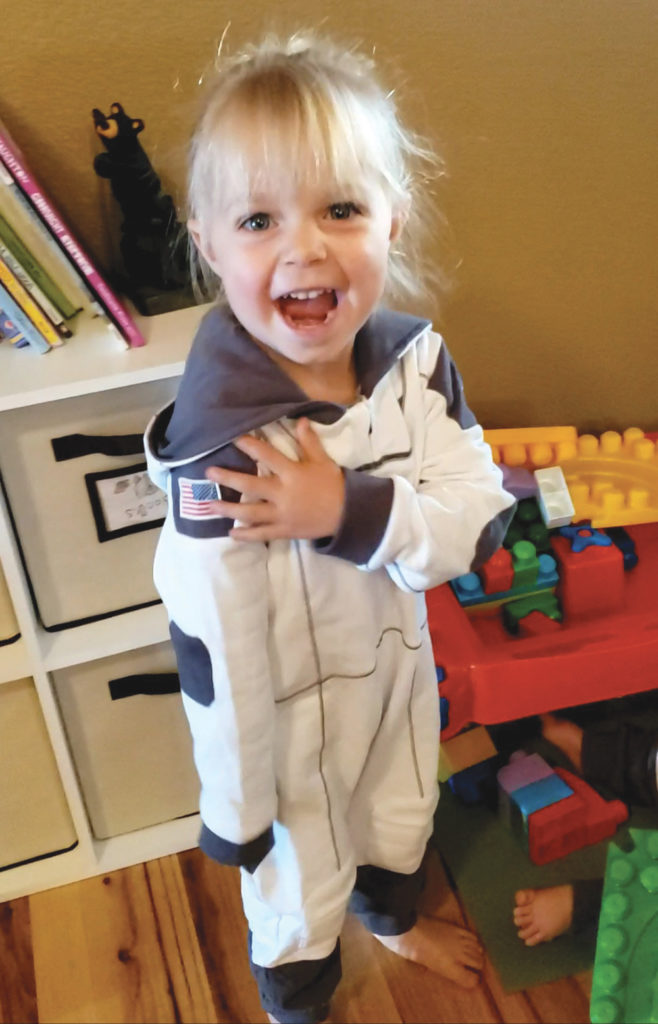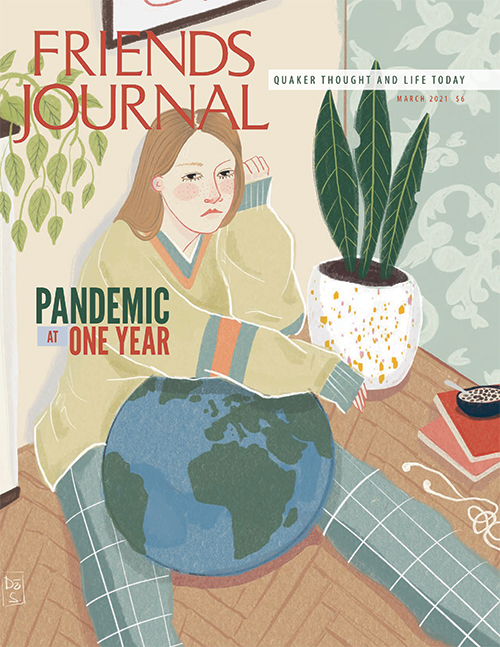My favorite two-year-old was an astronaut for Halloween. Enthusiastically punching her tiny fist straight through the air above, she exclaims, “Rocket to the moon!” The space suit, accessible at all times, is clenched in hand and transported overhead, flying like a kite through the living room. Her nimble body quickly folds into the suit, and I assist in the coronation of the helmet. She’s off and ready to go. “Go where?” For her, it’s to go eat lunch in her soon-to-be non-white astronaut costume. In reality the answer is: absolutely nowhere. Outings to the community playground, lingering in the library, playing with neighborhood kids or grandparents: each of these activities is a big “NO,” a familiar word for both of us.
So we stay in.
Snuggling into my lap, her body finds stillness, and her brain consumes the galaxy beyond by pointing and naming the spaceship, moon, stars, earth, and sun from a book. In these moments, my pandemic worries and fears melt away, and I take respite in her world: a world that revolves around laughter; animal noises; amazement of little things like pine cones and sticks; open-hearted love; concern for all, including spiders and flies; curiosity about space; and constant joy sprinkled with the occasional short meltdown.
I think many would explain our year as one big meltdown stingily sprinkled with short spurts of laughter and joy. If only I could rocket to the moon, I would wave to Earth and say, “I’ll be back!” Trading out a year of dark heaviness for the light and buoyant moon sounds . . . well . . . delightful! Peace on Earth has turned into COVID on Earth, a poorly directed sci-fi thriller meets reality TV show where masked people fight over toilet paper while Zooming and attempting to remain six feet apart.
COVID on Earth launched our communities into a universe filled with video chats and online meetings, taking the place of the brick-and-mortar structures. A year ago, the meetinghouse closed for lockdown and hasn’t reopened, but it continues to harbor local medical staff who are quarantining away from their families. Downtown Denver, once an explosion of activity, has the feel of a lazy Sunday afternoon with motionless streets stretched between boarded-up buildings and sporadic speckles of people. For the first time, I feel a spaciousness in the city. I’m able to change lanes in a relaxed way, causing a mini jolt of joy that quickly fades as I once again sense a feeling of emptiness and sadness. Block by block the numbers increase. An increased number of “for lease” signs are stamped on vacant buildings; more people without housing push and park shopping carts heaped with possessions; more COVID screening tents appear at the entrances of buildings; more parking spots read “Pick-up Only”; and more parked cars wait at food banks. All of these increases have us tilted on a new axis.
We’ve entered a period of trying to replicate and cram city amenities into our homes: dining room classrooms, front porch coffee shops, backyard bars, basement dorm rooms, garage gyms, and makeshift workspaces. Parks and backyards have become our local meeting space as we’ve circled up this year in small clusters.
On this particular Sunday, I worship in the backyard of a Friends’ mini-farm. My open umbrella, with its handle sandwiched between the crevice in my back and my collapsible camping chair, shields the vibrant sun from my eyes. The symphonic sounds of fresh vocal cords of day-old baby goats float through my ears; my eyes follow the outlines of the towering old trees against the blue sky; the sun shimmers over leaves that sway in the warm breeze, creating a disco ball effect with light and shadows. Masked, apart, and yet threaded by the Spirit, we worship with the grass under our feet.
Waiting worship in nature fills the craters of my soul with bliss. Yes, I do miss the meetinghouse space. I long to hear the squeaks and creeks of the hardwood floor; to feel the lingering winter chill in my hands right before the heater kicks in; to succeed in figuring out which coffee pot holds the “leaded” and which one the “unleaded,” affectionate terms from the Hospitality Committee; and most of all, to witness the burst of unmuffled “Good morning, Friends,” handshakes, hugs, and smiles after silently communing in the Spirit.
But for now, we Zoom.
The Brady Bunch intro squares combined with a futuristic mission control center and the modern term “Zooming” has added a new dimension to worship and gifted me with a form of time travel. Before COVID on Earth, my body was in perpetual motion. “Go where?” was the question. Darting and dashing around the city, I would scurry in my car to mingle in my various social spheres, all the while polluting the air we all breathe. Being tightly fastened to home has been freeing. Going “absolutely nowhere” has unfolded into a simplistic ease that with a push and a click, I’m beamed into a cyber room filled with people from around the world. With every ring of a virtual doorbell, the Brady Bunch squares multiply, filling my screen with tiny windows and tiny glimpses into the environments these Zoomers inhabit. Each one holds a playful story that my eyes translate in a creative Seussical fashion:
Little lap dogs in laps,
Cats on couches taking catnaps,
Whimsical walleye wallpapered walls,
Fireless fireplaces in purposeful places,
And my, oh my!
Is that a pecan pie?
To the man in the suit,
“Yes, yes, sir,
You are on mute!”

The author’s favorite two-year-old models a SpaceX suit.
COVID on Earth has me boldly going where I’ve never been before: space exploration—making space in my living room for an office, sharing space with neighbors howling at the moon, using outdoor space as restaurants and coffee shops, finding space for child-like wonder and playfulness in my life, holding space for my own and others’ grief and frustrations, giving space to those who need to checkout, and filling space with small things that bring joy.
Entering space with others is different during COVID. I feel a weighty gravity when exchanging pleasantries such as “HowAreYou?” Before, the phrase was spoken casually and quickly as if it was one word; now it’s filled with much more seriousness and depth: “How. Are. You?” and is like a babushka doll holding many more questions within: “Are you okay? Do you have enough food? Are you healthy? Did you lose a loved one?” Sadly, it took a pandemic for me to vocally express deep concern for all, including strangers. In this new space, I’m finding deeper connections in the shared honesty that wasn’t socially acceptable with strangers before.
My hope is that when COVID on Earth lifts, my new discoveries fold into my old life, and I enter into a new world: a world that revolves around laughter in the darkest of days; animal noises like fresh vocal chords of baby goats; amazement of little things like the Seussical-ness of Zoom; open-hearted love for a world deep in need, voicing my concern for all; and continued curiosity of space exploration.
My hope is that when COVID on Earth lifts, my new discoveries fold into my old life, and I enter into a new world: a world that revolves around laughter in the darkest of days; . . . open-hearted love for a world deep in need, voicing my concern for all; and continued curiosity of space exploration.
One night in the middle of dinner, my favorite two-year-old quietly slipped out of her chair, abandoning her meal; she stretched her arm up and clicked the light switch off. Leaving her mom, dad, and brother eating in the dark, she pushed the heavy sliding glass door open with her tiny, strong acrobatic body and toted her blanket into the darkness of the back deck. She tugged one of the outdoor dining chairs away from the table, climbed up and in, and burrowed under the blanket before looking up where the darkness of the house intensified the glow of the moon in the expansive sky. There her body found stillness, and her brain contemplated the galaxy beyond. She went nowhere but was present in a moment of childlike curiosity and wonder, finding peace on Earth.




Wonderfully written, very enjoyable essay. I am also looking forward to the end of Covid on Earth.